People suffering from motion sickness may be able to prevent their symptoms from developing just by listening to a minute of special sound, a Japanese research team said.
The research found a sound at 100 hertz stimulates the inner ear and helps to reduce motion sickness by improving balance, the team said, while current preventive measures are largely limited to taking medicines.
The study comes as the risk of suffering from motion sickness is on the rise with the development of self-driving vehicle technology, as it is passengers rather than drivers that tend to develop symptoms, according to the team, which includes researchers from Nagoya University.

Supplied photo shows an experiment to monitor motion sickness using a driving simulator. (Photo courtesy of Masashi Kato, professor at Nagoya University)(Kyodo)
In the experiment, around 80 volunteers were exposed to the special sound at a certain volume for one minute shortly before riding on a swing, a driving simulator and an actual car, while a similar group took part without exposure to the sound.
The study showed 70 to 80 percent of those who were exposed to the sound found symptoms such as lightheadedness and nausea were alleviated, according to the findings published last month in medical journal Environmental Health and Preventive Medicine.
The improvement in such symptoms is believed to have been caused by the sound stimulating the otolithic organs in the inner ear, thus activating the vestibular system, the team said.
“We’d like to put (the study) into practice at an early date after carefully confirming its safety. We hope that this will be an option for people suffering from motion sickness,” said Masashi Kato, a Nagoya University professor who participated in the research.
Related coverage:
Japan hospital uses insulin-producing iPS cells for type 1 diabetes
Innovation over tradition sending Dassai sake to the Moon
Japanese people more susceptible to authoritarian messages: research


AloJapan.com